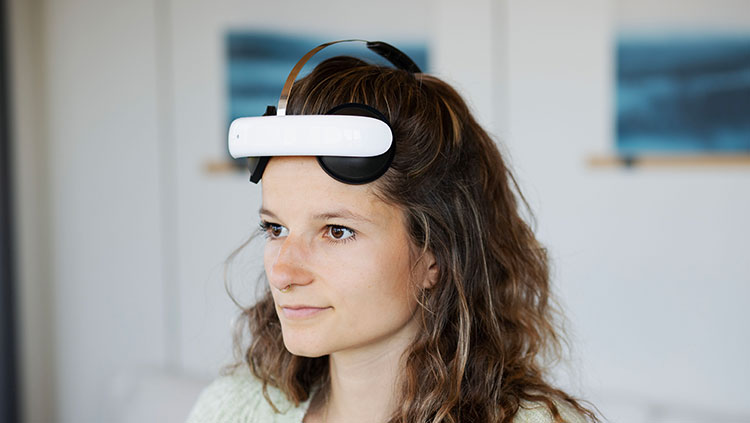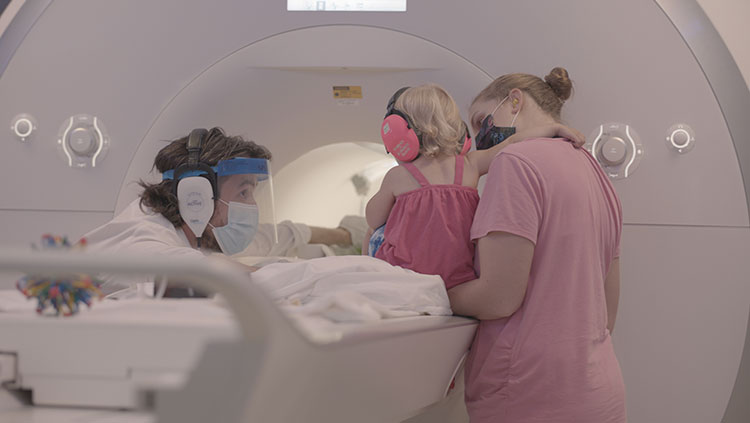ICYMI: New Trial Sheds Light on Potential At-Home Depression Treatment
- Published14 Nov 2024
- Author Bella Isaacs-Thomas
- Source BrainFacts/SfN

A wireless headset could one day be a home treatment option for people with major depressive disorder (MDD). The headset designed by the Swedish company Flow Neuroscience offers a self-administered approach to transcranial direct current stimulation (tDCS), which works by delivering a mild electrical current to alter brain activity in specific regions. The results of a phase II clinical trial evaluating the tool’s efficacy were published Oct. 21 in Nature Medicine.
The trial involved 174 people who were diagnosed with MDD and going through a depressive episode of at least moderate severity at the time. Over the course of 10 weeks, participants wore the headset during 30-minute sessions which were supervised remotely by a professional. Half of them received consistent electrical stimulation to their dorsolateral prefrontal cortex — a brain region involved with decision-making and cognition and frequently less active among people with depression, according to Nature — while the other half served as a control group and did not receive active treatment.
Around 45% of participants who received the stimulation achieved remission of their depressive symptoms, compared to almost 22% of the control group. Although the findings are evidence of the headset’s safety and efficacy, they also come with some caveats. For example, people whose depression didn’t respond to at least three interventions were barred from the study, according to The Conversation, and the majority of participants were white, reflecting the trial’s limited demographics. Still, the study offers some novel insight into the technology’s potential.
Big Picture: Major depressive disorder can cause significant suffering for those affected. What’s more, just under a third of cases are considered treatment resistant, meaning they don’t respond to antidepressant medications. Neuromodulation therapies like the one delivered by this headset offer an alternative approach to drug-based treatments for depression, but existing treatments require patients to make time for regular visits to a clinic. A viable home-based option could be a game changer, but it’s not yet clear whether this headset will fill that niche, at least in the United States. Flow Neuroscience, the funder and sponsor of the trial, already markets the device in several countries around the globe and is currently seeking FDA approval, according to CNN.
Read More: At-home brain stimulation could be promising depression treatment, trial hints. Live Science
More Top Stories
- Our brains can detect odor changes in a matter of milliseconds. Science News
- Two injured comb jellies physically fused together, resulting in a joint nervous system. Scientific American
- AI can be trained to see face-like patterns in objects, mirroring a well-known quirk of our brains, a preprint study suggests. Science
- Semaglutide, an active ingredient in Ozempic and Wegovy, is linked to a reduced risk for Alzheimer’s disease among people with type 2 diabetes. NBC News
- A small study found looking at original art in museums may stimulate the brain more compared to gazing at reproductions in the museum shop. The Guardian
- Deep sleep following a heart attack promotes healing by tamping down inflammation. Nature
- The way you breathe is associated with whether you have the ability to detect smells. Popular Science
- Expectation may influence how the brain reacts to spicy flavors. New Scientist
- Millions of older adults with cognitive impairments live alone. Many struggle with daily activities and can’t access the caregiving help they need. KFF Health News
CONTENT PROVIDED BY
BrainFacts/SfN
References
What to Read Next
Also In Neuroscience in the News
Trending
Popular articles on BrainFacts.org


.jpg)















